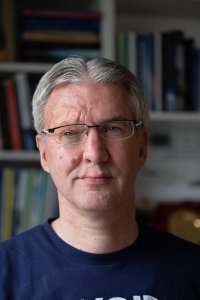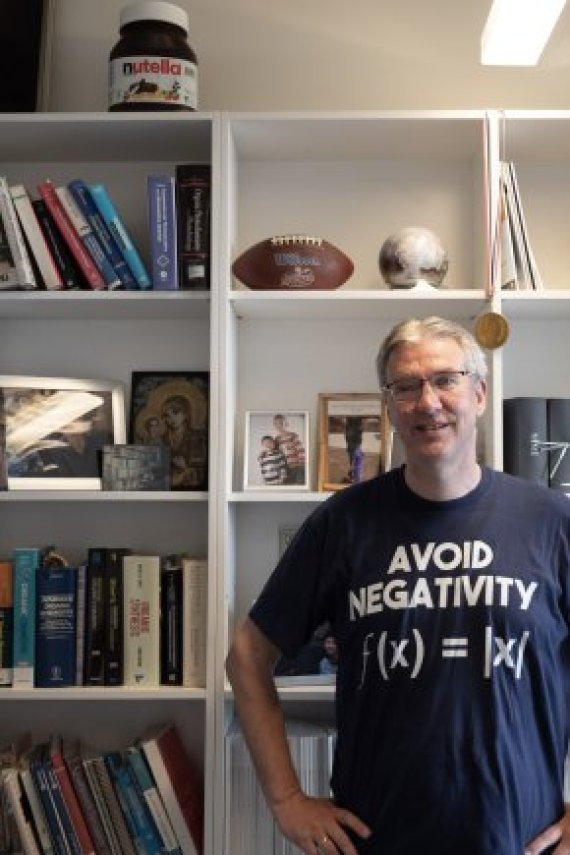Text Roelof Kleis photos Guy Ackermans
There is a large vase on Professor Han Zuilhof’s desk on the top floor of Helix. Until he took them home, it contained the flowers he was given in honour of his joining the ranks of the illustrious at the prestigious British Royal Society of Chemistry. This great day was suitably celebrated in Zuilhof’s Organic Chemistry chair group – once the news had sunk in, that is. ‘I opened an email from the Royal Society of Chemistry in which my rights as a fellow were explained. ‘Hey, have I missed something?’ I replied. It turned out that the letter of appointment had been sent by mail, and was still at the secretariat. I was just back from two weeks in China.’
Positieve waarden
Han Zuilhof (53) laughs about it now. He is casually dressed in light brown summer trousers and a striking blue T-short with Avoid Negativity printed on it, above the mathematical function f(x) = |x|. A statement wrapped up as a joke: the formula only allows for positive values. There is a tall bookcase full of philosophy and chemistry books against the wall. On top of another cupboard stands a portrait of Simon Olivier, Wageningen’s first professor or organic chemistry. A tribute to an illustrious predecessor. On the door opposite the desk hang portraits of his two sons.
‘Splendid, of course,’ says Zuilhof of his fellowship. Only people who have made an outstanding contribution to the progress of chemical science qualify – if nominated – for honorary membership of the Royal Society of Chemistry. ‘It is an acknowledgement of the work my team and I have been doing for the past 20 years.’ And it is an honour that has not been bestowed on very many Dutch scientists. ‘As far as I know, physical chemist Hans Lyklema is the only honorary fellow from Wageningen.’ But that is another category, and it was after he retired. ‘To date I am the only one to join the Society as an active chemist.’
The peace and quiet of philosophy attracted me, but working in a laboratory is much more sociable
And that for someone who might have become a philosopher. What’s the story?
‘After leaving secondary school in Sassenheim I went to Leiden to do chemistry. But after a year I wanted to do something else as well. I had theology in mind, actually, but if you don’t have a talent for languages, learning Greek, Latin and Hebrew is quite a task. So then I started studying philosophy and that was just the job. After graduating (double cum laude, RK) I was offered a PhD place in both subjects. Then I compared the two fields in terms of what it would mean practically and came to the conclusion that being a philosopher is a very lonely business. On the one hand, that peace and quiet attracted me, but working in a laboratory is much more sociable. That was decisive. And I’ve never had any regrets.’
Did Zuilhof the chemist pick up anything from Zuilhof the philosopher?
I gained a lot from it. Philosophy students had to hand in an essay every Tuesday. Whether you had any inspiration or not. So you learned to write and to structure a narrative. As a scientist you have to write proposals and articles. So I had already been trained to do that. And as a philosopher I concentrated mainly on theory of knowledge: what you can know and what you can’t. That gives me a meta perspective. Chemistry is a great subject, but it is of course just a profession like any other. Modern science is a rat race. You get carried along with the tempo of things, and that tempo just gets faster and faster. There is a risk of your field of vision narrowing. In that sense it is nice to have anchor points outside your own field, which make such a meta perspective possible. There are of course other ways of doing that than studying philosophy.’

Professor of Organic Chemistry Han Zuilhof: ‘I spent much of my first four years in hospital. I had a tumour on my face.
American accent
After getting his PhD in Chemistry, Zuilhof went to the United States for two years. That is where he picked up his American accent – which not all his colleagues appreciate. He laughs. ‘Yes, absolutely. But not only in that period. The Leiden r matches the American r perfectly.’ Back in the Netherlands, he opted for a job as assistant professor at Wageningen. ‘I had never been to Wageningen. There was a vacancy in an interesting physical-organic chemistry group.’
Zuilhof started in 1997 under chair-holding professor Ernst Südholter and then rose up through the ranks, in his own words. ‘I became personal professor at the beginning of 2007. Südholter went to Delft in 2006 and at the end of 2007, they were looking for a successor. I sent off my letter of application on the last day it was possible. Being personal professor is a wonderful job: you can do a lot of research without all the admin you have to do if you are a chair-holder. But if you really want to steer the research, you do have to lead the group.’
A romantic surface rejects everything except that one substance that you are interested in
The focus of the chair group changed a lot after that. Why?
‘To be honest, there wasn’t really any focus. And that is not good for a group. So then we went down a successful new route together, focusing on the modification of inorganic surfaces with organic material, in order to give it more functions.’
Do you have an interesting example?
‘The romantic surfaces! That is a term I introduced into the literature. In a romantic relationship you say no to everything and everyone except that one special person. A romantic surface does the same thing. It rejects everything, but picks out that one substance that you are interested in. That is of particular interest for medical diagnosis. In blood serum, for instance, there are all sorts of proteins, cells and other biological material, but sometimes you want to fish out one specific biomarker. We are working hard on that, on strong bio-selective surfaces that can be used in biometrics. An example would be something like a lab-on-a-chip, with which you can analyse processes or get hold of and develop selected components. When you do that, you make a liquid containing a tiny quantity of something you want to detect flow through a small channel in a microchip. You stop after a while and rinse the liquid away with another solvent. Then it is concentrated enough for you to measure it. These kinds of surfaces are now being launched on the market by a spin-off.’
You mean Surfix, in Plus Ultra?
‘Yes, I set that up in 2010. In the years before that I applied for three patents for methods of coating surfaces, with the idea of doing something with it. But I am not a businessman, I am a professor. So I first looked for someone who could use that patent to create and market a product, and then I found two financiers. The company, led by Luc Scheres, one of my ex-PhD students, now employs 15 people and is going great guns worldwide.’
I have patents but I am not a businessman
Adopted son
Alongside his work in Wageningen, Zuilhof also works for universities in Saudi Arabia and China. He linked up with the King Abdul-Aziz University in Jeddah through a postdoc who got a job there. One of his motives behind this collaboration was that he wanted to support an increased role for women in science. ‘The Saudis want that themselves, and slowly by slowly it is starting to come.’ Zuilhof adds that the university has excellent analytical equipment which is not available in Wageningen. ‘That means we can look at things on an atomic scale there. We do part of the analysis there of samples we make here. But I don’t go there very often. Most of the contact goes via DHL, email and WhatsApp.
He travels to China a lot more often. Zuilhof spends five or six weeks a year working at Tianjin University ‘on things that complement what we do here’. His connection with China goes beyond work, though. He points to the portraits of his sons. ‘The one on the left, the 16-year-old, has my genes, the one the right, the 14-year-old, doesn’t. He is an adopted child from the south-west of China, and he was a wonderful present, just like his brother. I love them both equally. I really don’t notice any difference,’ he adds, forestalling the question adoptive parents are often asked. ‘Passing on your genes is important scientifically. So there is a kind of mental instinct underlying your love of your child. But it goes beyond that too. It’s beautiful to experience that. Love goes beyond blood ties.’
Stargazing
Philosophy is never far away with Zuilhof. Earlier in our discussion we talked about astronomy. At night Zuilhof loves to gaze at planets, stars and galaxies through his telescope. Anything he can spot that gives off perceptible light. ‘It puts the human race in its place. Light rays from the Andromeda galaxy were sent out three million years ago. That fascinates me. It show how small we human beings are in one sense.’ And then he talks about the scar above his right eye, with its slight squint. ‘As a tiny baby I was in a critical condition and spent much of my first four years in hospital. I had a tumour on my face. As a result I am almost blind in my right eye. I was in a ward with four infants. Two of the four survived and two did not. I realize every day: wow, I have lived to see another day. It could have been different. My whole life is a present.’
And some days bring additional presents, such as a fellowship at a prominent chemistry society. This raises the question of what Wageningen’s future looks like, as far as chemistry is concerned. ‘We are still expanding,’ says Zuilhof. The group, now at about 50 men and women, is getting bigger and bigger. This is partly because we’ve attracted successful young members of staff such as Maarten Smulders and Louis de Smet, both of whom are members of Wageningen Young Academy. De Smet is trying to reclaim materials by tuning porous surfaces – getting lithium and phosphate out of water, for instance. With the techniques he develops for this, he helps other very different applications advance further too.’
Material design
Zuilhof’s group is also interested in predicting the properties of materials on the basis of the properties of the molecules they are made up of. ‘That’s material design. By improving preparatory and analytical techniques we are increasingly able to look at large aggregations of molecules rather than just at isolated molecules. Measuring is becoming ever more important. You can see that everywhere in society. We don’t just want to know that there is a certain substance in a sample; we want to know exactly how much of it there is in the sample, and where. We stand to gain a lot from that development from molecule to material,’ says Zuilhof. ‘Like this my hope as a scientist is that I can pass on all I’ve been given to society.’

